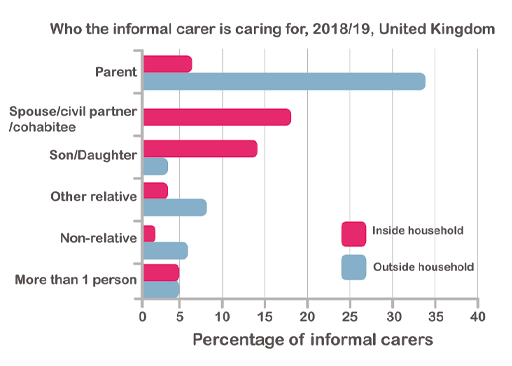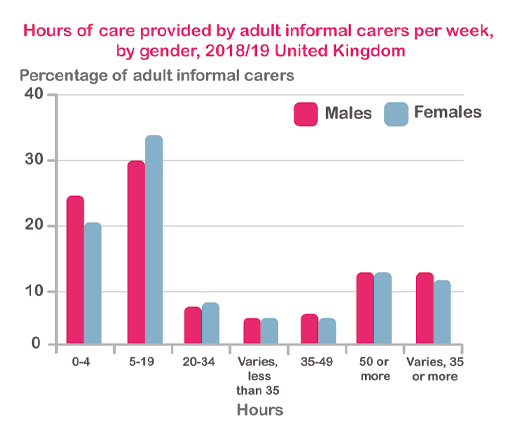2 The role of the carer
One of the main determinants of the hours spent caring are the health conditions of those being cared for; over half (58%) have a physical disability, one fifth (20%) have a sensory impairment; 13% have a mental health problem; and 10% have dementia (Carers UK, 2019b). Further analysis of these figures shows that a significant proportion (70%) of the cared-for population are parents/in law or spouses/partners who are over 65 with age-related physical disabilities or chronic physical and mental health conditions. Common age-related problems include sensory impairments, dementia, and/or mobility issues. Other key health issues or conditions that require carer input amongst younger adults are learning disabilities, mental health problems, a terminal illness such as cancer, alcohol or drug dependency, and diabetes (Carers UK, 2019b; Public Health England, 2021).
The Family Resources Survey (Department for Work and Pensions, DWP, 2020), interviewing over 19,000 families, found that family members were the main recipients of informal care, as illustrated in Figure 2. Note also the percentage of carers who are caring from inside and outside of the household.
Some of the most common types of care provision offered by carers in England include:
- 82% provide practical help such as preparing meals, doing laundry or shopping.
- 76% keep an eye on the person they care for.
- 68% keep them company.
- 62% take the person they care for out.
- 49% help the person they care for with financial matters.
- 47% help the person they care for deal with care services and benefits.
- 38% help with aspects of personal care.
- 38% provide physical help.
As illustrated in Figure 3, the majority of carers provide up to 19 hours of care per week, but there are over 15% of carers providing care for over 35 hours per week. Census data between 2001 and 2011, identifies the growth in unpaid care was highest in the 50 hours or more of caring (Office of National Statistics, 2013). Furthermore, in 2016-17 data, over a third of carers (35.7%) provided over 100 hours a week of care (Adult Social Care Statistics Team, 2017). A focus on the health and wellbeing of carers needs to be emphasised as caring for even a small amount of time each week can affect a carer’s ability to consider their own health and wellbeing.
Activity 1
- Reflect on your role, or that of a known carer. Do you/they identify as a carer? What are your/their main tasks? Has this role changed over time?
- Does any of the information presented in these opening sections surprise you?
Discussion
It can take up to two years to identify as a carer (NHS, n.d.). As an informal carer you might provide help and support to a spouse, child, parent, sibling, other relative or a friend. The role that you reflected on might have included domestic duties, physical/manual help, aspects of personal care and provision of medication. The level, duration or intensity of such a caring role will depend upon the care needs of the person that you support.
If you are not a carer, you might have been surprised to learn that approximately 3 in 5 adults in the UK will be a carer at some point. This role could be anything from helping with the weekly shop to providing daily personal care.
You will now explore who these carers are.


